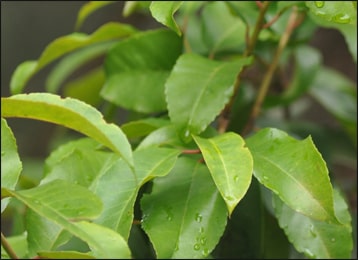
What is Prunus Africana?
Prunus africana is commonly known as Pygeum or winter cherry. It is an evergreen monoecious tree and native to 22 countries in Sub-Saharan Africa. Its wild tree species is only found in tropical forests.
The inside of the stem comprises bark which is red in colour. Its fruit colour is white and the flowers are dull purplish and brown in colour and are spherical in shape.
Plant Description
It is a medium to large, evergreen tree with a spreading crown of 10-20 m when mature. It is widely distributed in Mount Kenya Forest and other several provinces of Kenya.
This plant has multiple health benefits in Kenya traditional medicine to treat chest pain, malaria and fever. Other traditional uses are: diarrhoea, allergies, stomachache, diseases of prostate gland, and kidney disease.
In modern medicine, its stem bark water extract is used to manufacture products used for the treatment of prostate gland hypertrophy (BPH) and serious problems of benign prostate hyperplasia (BPH).
What are the Properties of Prunus Africana?
Family: Rosaceae
Common Name: Red Stinkwood tree, Pygeum
P.africana has been over-exploited for its health benefits but there is a less effort geared towards its conservation so it has been classified as a vulnerable species facing a high risk of extinction.
What are the Bioactive Compounds found in Prunus Africana?
Certain bioactive compounds found in Prunus africana are triterpenes, sterols, coumarin, and flavonoids which have anti-inflammatory, anticancer, anti-viral and anti-microbial properties.
What are the Medicinal uses of Prunus Africana?
The Prunus africana tree species has a wide number of applications in African traditional system of medicine where its stem, bark, and leaves are used. The main part used for medicinal purposes is the stem bark of the tree which is used for medicinal purposes by African people since ancient times.
Benign Prostatic Hypertrophy (BPH)
Its bark is highly valued for its medicinal properties. The dull gray to brown black bark is used for the treatment of BPH.
- It is particularly used as a treatment for benign prostatic hyperplasia and prostate gland hypertrophy that commonly affect the older men.
- The herb improves urinary symptoms associated with BPH which is marked by the enlargement of the prostate gland.
- It significantly reduces the urinary frequency and pain with urination in men who suffer from mild to moderate BPH symptoms.
- Use of Prunus africana is the primary course of treatment for enlarged prostate.
- So, it is a wonderful medicinal plant species that has the potential to save the world from the current global deadly disease known as prostate cancer.
Anti-microbial Property
P.africana is reported for its anti-microbial activity and the plant showed anti-microbial and antifungal activity in various researches.
The mode of action of anti-microbial activity is probably due to their ability to make complex with extracellular and soluble proteins in bacterial cell walls.
- So, its extracts have been used for the treatment of chest infections and diarrhoea.
- Flavonoids are known to be synthesized by this plant in response to microbial infection.
- Flavonoids have been found to be anti-microbial substances against a wide array of micro-organisms.
In a research on P.africana, it was concluded that this plant species showed promising activity against gram negative, gram positive bacteria therefore supporting its traditional uses and thus providing a scientific proof of its claimed efficacy against micro-organisms.
Its activity against Staphylococcus aureus bacteria means that it is a potential good source of non-toxic anti-microbial agents for drug resistant as well as drug sensitive strains.
What are the Other uses of Prunus Africana?
- Water is added to pounded bark and the red liquid thus obtained is used as a remedy for stomach ache.
- Its bark is also used for the purpose of wound healing.
- Apart from the bark, its leaves infusion is used to treat various disorders such as: improving appetite, treatment of genital infection and hirusutism (a condition that is characterized by unwanted and male-pattern hair growth) in women.
- The bark of this tree is also an aphrodisiac for enhancing vitality and sexual power in males.
- Despite its medicinal properties, Prunus africana is used in charcoal production as well as timer production.
Precautions
- Its fruits and flowers generally have very low concentrations of the toxins cyanide, though the seeds and young shoots contain much higher levels of cyanide.
- So, the excess use of P.africana is not recommended as the prolonged use of this plant causes various poisonous effects as in larger concentrations, cyanide can cause weakness, pupil dilation, and respiratory failure leading to death.
- Its level of toxins can be detected by the level of bitterness. Great caution should be taken if the flavor is moderately to very bitter in taste.
